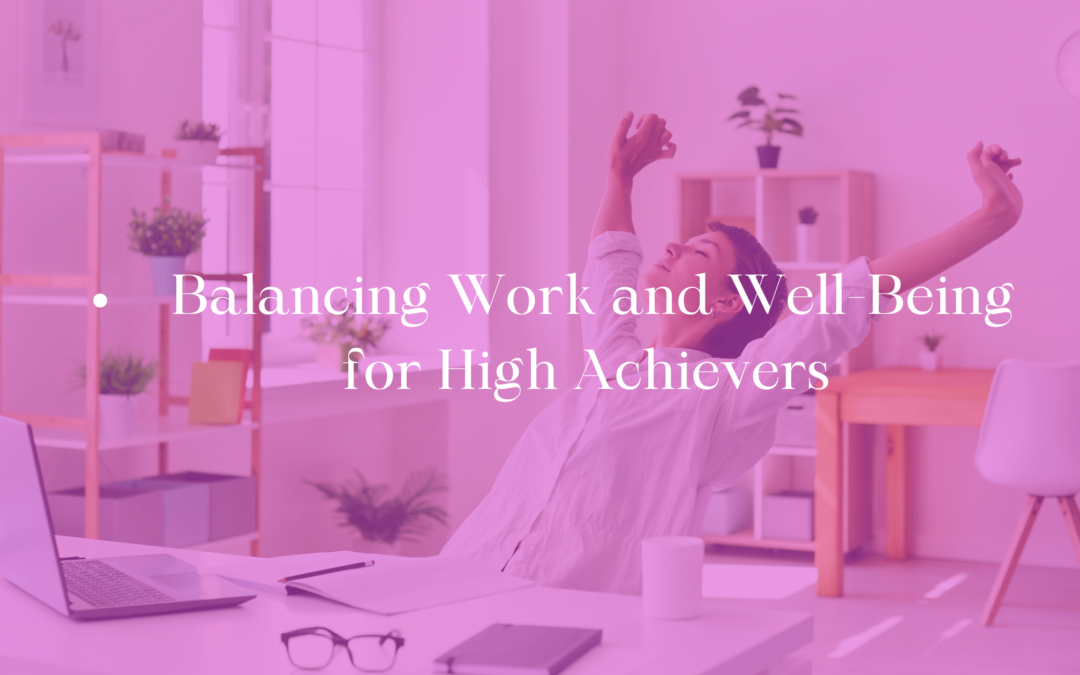
Balancing Work and Well-Being: Strategies for High Achievers
For high achievers, the relentless pursuit of success often leads to long work hours, high levels of stress, and a constant drive to reach the next goal. While this ambition can fuel career advancement, it can also affect mental, emotional, and physical well-being. Finding a balance between work and personal life is crucial to prevent burnout and maintain long-term success. This article explores strategies to help high achievers nurture their careers and well-being.
Recognizing the Need for Balance:

Many high achievers face the pressure to perform at their best in every situation, leading to overwork and neglect of personal needs. However, failing to prioritize well-being can decrease productivity, creativity, and overall satisfaction.
Signs That You Need Balance:
- Constant feelings of overwhelm or burnout.
- Difficulty disconnecting from work during personal time.
- Reduced motivation or passion for your career.
- Neglecting self-care activities like exercise, hobbies, or sleep.
Setting Boundaries for Work and Personal Life:
Boundaries are essential for maintaining balance. High achievers may work around the clock without a clear separation between work and personal time, leading to burnout. Setting firm limits allows for time to recharge and return to work with renewed focus.
How to Set Boundaries:
- Define Work Hours: Set a specific start and end time for your workday, and stick to it as much as possible.
- Prioritize Breaks: Take regular breaks throughout the day to clear your mind and prevent fatigue.
- Create a No-Work Zone: Dedicate certain spaces in your home or times of the day for personal activities only, free from work distractions.

Practicing Mindfulness and Stress Management:
Mindfulness can help high achievers manage stress, increase focus, and stay grounded in the present moment. It’s a valuable tool for reducing anxiety and maintaining mental clarity, especially when juggling multiple responsibilities.
Simple Mindfulness Practices:
- Deep Breathing: Take a few moments throughout the day to focus on breathing, calming your mind and body.
- Meditation: Set aside time daily to meditate, even for 5-10 minutes. Apps like Headspace or Calm can be helpful.
- Mindful Breaks: Incorporate mindfulness into your breaks by stepping outside, stretching, or simply observing your surroundings without distraction.
Prioritizing Self-Care and Well-Being:
Self-care is often overlooked by high achievers who may prioritize work over their health. However, regular self-care activities are vital for sustaining energy and focus in the long term.
Essential Self-Care Strategies:
- Physical Activity: Exercise is a proven way to reduce stress and boost energy. Find a routine that works for you, whether it’s yoga, running, or strength training.
- Healthy Eating: Fueling your body with nutritious foods helps maintain energy and supports cognitive function.
- Sleep Hygiene: Prioritize sleep by establishing a relaxing bedtime routine and ensuring you get enough rest each night.
Delegating and Seeking Support:
High achievers often feel they must take on everything themselves, but this mindset can lead to exhaustion. Learning to delegate tasks and seeking support from colleagues or family members can lighten the load and allow for more balance.
Tips for Delegation:
- Identify Non-Essential Tasks: Determine which tasks can be delegated to others, freeing time for high-priority projects or personal activities.
- Trust Your Team: Empower others to take on responsibilities and trust in their ability to execute them effectively.
- Ask for Help: Don’t hesitate to seek support when you need it, whether from a mentor, coach or loved ones.
Balancing work and well-being is an ongoing process, especially for high achievers constantly striving for excellence. By setting boundaries, practicing mindfulness, prioritizing self-care, and seeking support, you can maintain your drive for success while ensuring your well-being is nurtured. Remember, true success includes both professional achievements and personal fulfillment.


Recent Comments